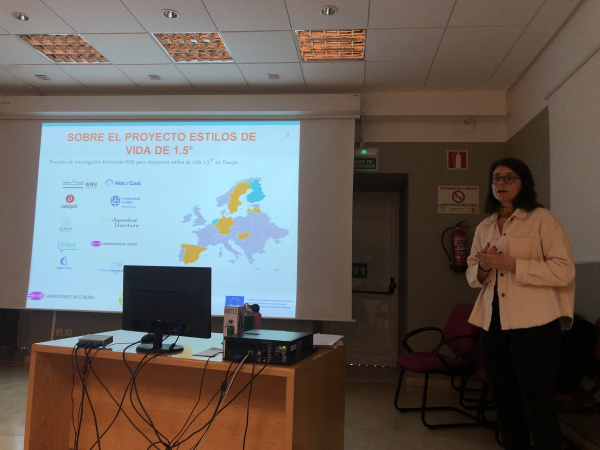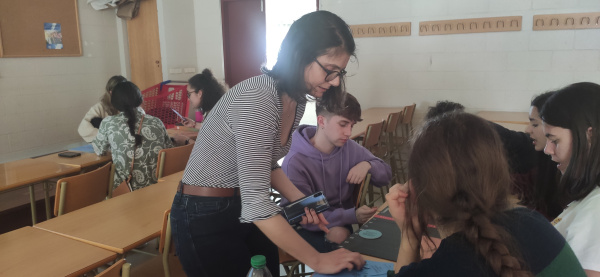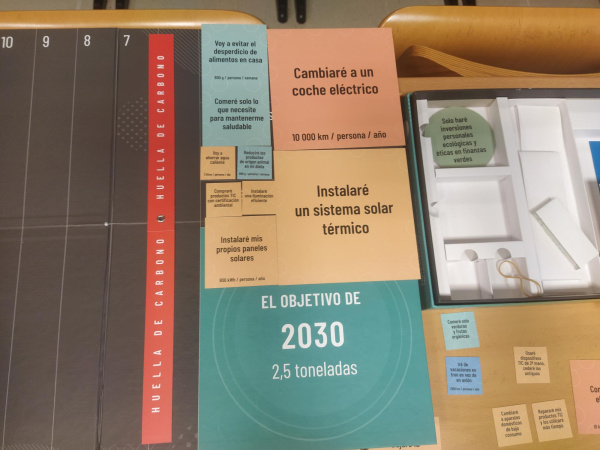
Our project partner University of A Coruña has been spreading the word about the pathways for a more low-carbon lifestyle with the university community during the Environmental March initiative.
On behalf of the UDC team, researcher Nadin Ozcelik has delivered two workshops on the low-carbon lifestyle options in main consumption areas (nutrition, mobility, housing and leisure) to the UDC students, academic and administrative staff during the 6th Edition of Environmental March. The event was organised by the Environmental Office of the UDC (OMA) to increase environmental awareness of the university community and members through a series of activities, including site visits to the wind farms, round tables, seminars and workshops.
The very first workshop round took place at the campus Ferrol on March 22, with the participation of Industrial Design degree students and university staff from OMA. The participants explored the pathways to adopt a low carbon lifestyle by playing with our Climate Puzzle. The second round was held on March 29 at the campus Elviña, with a broad range of participants including the Social Education degree students, academic and administrative staff.
In both sessions the participants showed a great interest in the Climate Puzzle, which spark inspirational debate among the participants, specifically on lifestyle options they are ready to integrate into their daily lives by 2030. The participants from both workshops reported that they will adopt responsible consumption practices in the domains of nutrition and mobility. For instance, they are ready to avoid generating food waste at their homes, eat seasonal and organic fruit and vegetables, drink tap water rather than bottled one, reduce animal-based products in their diet, as well as sharing car to move around.

Different choices among participants have been registered in the housing domain, specifically in terms of energy use. On the one hand, almost half of the group in the first round stated that they would switch to renewable energy at their homes, whereas the other half - as well as the participants from second round - found such option financially challenging to them. On the other hand, the use of second-hand ICT products and reducing the room temperature were indicated as the most popular options by the participants of the second round.
Financial savings is the main reason behind the adoption of the abovementioned options, leading to responsible food consumption and energy efficiency. Furthermore, the participants found these practices easy to be integrated into everyday life and potentially applicable in the long-term. However, options such as switching to a vegan diet, housing renovations, travelling long distances by train, switching to public transport and buying an electric car, were considered not viable, as neither cost efficient nor applicable into the everyday life.
Specifically, the students shared their interest in using public transport, but limited by the lack of infrastructures. In fact, some small towns in Galicia are not well connected to the cities, or some of them do not even provide bus/train services. Similarly, switching to electric cars or installing solar panels seem quite inconvenient for students due to high costs; on the opposite, a few participants from university staff consider these options feasible.

Last but not least, the Climate Puzzle has been the star of both workshops. The participants were quite motivated to discuss the low-carbon lifestyle options with each other, including the factors that can help them incorporate these options e.g., economic incentives.
However, participants stated that some options are not adequate for the Spanish context, in particular, getting a small(er) pet, if I get a new one was quite unacceptable. In fact, participants pointed out that classifying pets for their sizes could be discriminative.
Source of pictures: EU 1.5° Lifestyles consortium partners ©

